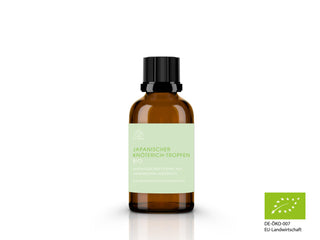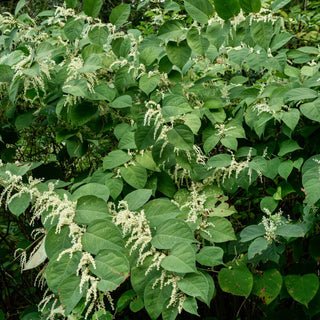-
Japanese knotweed organic extract drops
Origin of Japanese knotweed:
The plant clan Polygonaceae (knotweed family) also includes Japanese knotweed, whose natural distribution is in the regions of China, Japan and Korea. This plant is said to have a high concentration of vitamins, minerals and phytochemicals, especially resveratrol - a polyphenol.
Potential areas of application for knotweed:
Polyphenols are known for their antioxidant abilities and neutralizing free radicals. In synergy with vitamins, they can reduce oxidative damage in cells and thus support the immune system. Studies suggest that resveratrol may help reduce the risk of atherosclerosis, cancer and regulate blood sugar. However, older parts of the plant have an increased content of oxalic acid and should be avoided.
In traditional Asian medicine, knotweed is used to promote blood circulation, detoxification and diuresis. While in Europe its consumption is mainly recommended to strengthen the body's general defenses, resveratrol is also said to have anti-aging properties. Laboratory studies showed potential inhibition of cancer cells.
Japanese knotweed has antimicrobial properties and can be effective against bacteria, viruses and fungi. It has positive effects on blood pressure, can have a pain-relieving effect and is used to cleanse the blood. Preparations made from this plant, such as knotweed manure, can also serve as natural protection against certain pathogens in horticulture.
Another important active ingredient in the plant is emodin, which has a positive effect on sugar metabolism, has a mild laxative effect and can potentially be helpful for various complaints. External applications, for example with freshly ground leaves or roots, can have a supportive effect on skin problems due to the tannic acid content.
Japanese knotweed and menstrual problems
Among other things, emodin is valued for its potential ability to relieve menstrual cramps. These symptoms can range from pain to cramps to mood swings. While there is evidence that Japanese knotweed may help with menstrual cramps, further scientific research is needed to determine the exact effects and optimal dosage for such uses.
Evidence suggests that the plant extract may also be effective for acne by penetrating the protective barrier of the bacteria that cause it. The roots of Japanese knotweed are primarily used in traditional Chinese and Ayurvedic medicine.
Contents per drop:
Organic Japanese knotweed extract (alcoholic): 15.33mg
Recommended dosage:
2 x 20 drops daily
Capacity:
50ml
Japanese knotweed organic extract drops
Origin of Japanese knotweed:
The plant clan Polygonaceae (knotweed family) also includes Japanese knotweed, whose natural distribution is in the regions of China, Japan and Korea. This plant is said to have a high concentration of vitamins, minerals and phytochemicals, especially resveratrol - a polyphenol.
Potential areas of application for knotweed:
Polyphenols are known for their antioxidant abilities and neutralizing free radicals. In synergy with vitamins, they can reduce oxidative damage in cells and thus support the immune system. Studies suggest that resveratrol may help reduce the risk of atherosclerosis, cancer and regulate blood sugar. However, older parts of the plant have an increased content of oxalic acid and should be avoided.
In traditional Asian medicine, knotweed is used to promote blood circulation, detoxification and diuresis. While in Europe its consumption is mainly recommended to strengthen the body's general defenses, resveratrol is also said to have anti-aging properties. Laboratory studies showed potential inhibition of cancer cells.
Japanese knotweed has antimicrobial properties and can be effective against bacteria, viruses and fungi. It has positive effects on blood pressure, can have a pain-relieving effect and is used to cleanse the blood. Preparations made from this plant, such as knotweed manure, can also serve as natural protection against certain pathogens in horticulture.
Another important active ingredient in the plant is emodin, which has a positive effect on sugar metabolism, has a mild laxative effect and can potentially be helpful for various complaints. External applications, for example with freshly ground leaves or roots, can have a supportive effect on skin problems due to the tannic acid content.
Japanese knotweed and menstrual problems
Among other things, emodin is valued for its potential ability to relieve menstrual cramps. These symptoms can range from pain to cramps to mood swings. While there is evidence that Japanese knotweed may help with menstrual cramps, further scientific research is needed to determine the exact effects and optimal dosage for such uses.
Evidence suggests that the plant extract may also be effective for acne by penetrating the protective barrier of the bacteria that cause it. The roots of Japanese knotweed are primarily used in traditional Chinese and Ayurvedic medicine.
Contents per drop:
Organic Japanese knotweed extract (alcoholic): 15.33mg
Recommended dosage:
2 x 20 drops daily
Capacity:
50ml

Traditional effect for holistic well-being
In traditional Asian medicine, Japanese knotweed is considered a versatile remedy. The organic extract drops promote blood circulation, support detoxification of the body and have a diuretic effect. These traditional treatments offer holistic support for your well-being, based on centuries-old healing practices.

Antioxidant power for cell protection
The Japanese knotweed organic extract drops are rich in polyphenols, especially resveratrol, which have a strong antioxidant effect. This compound neutralizes free radicals, reduces oxidative stress damage and strengthens cellular defenses. Our product therefore offers an effective protection mechanism for your health at the cellular level.
